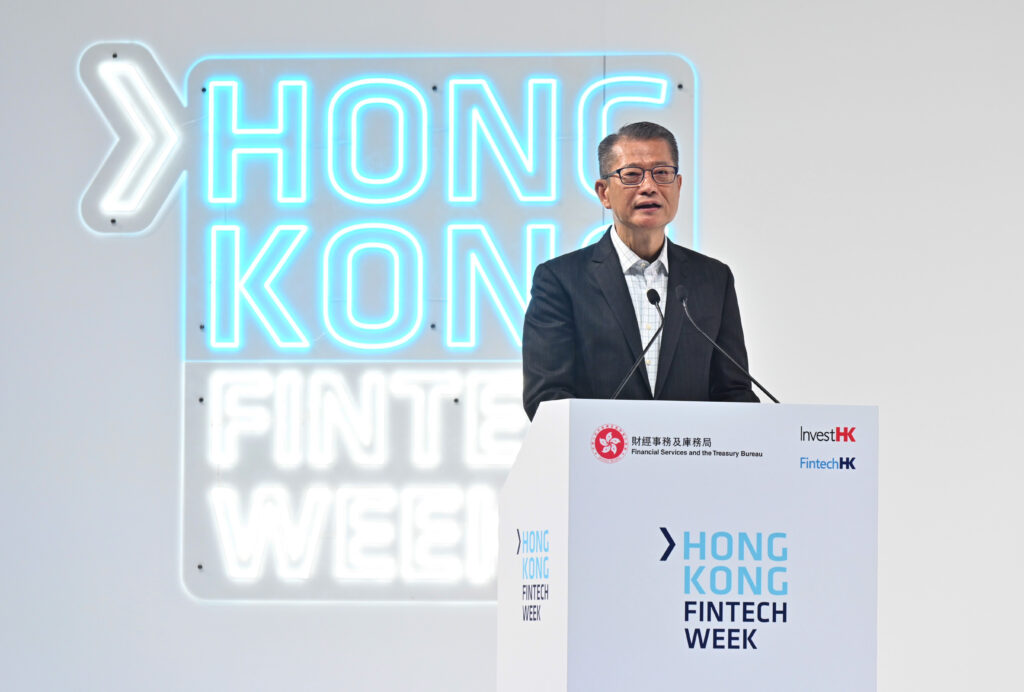Hong Kong’s digital asset industry has been dealt a blow in recent years, with the city losing its luster as a global hub for digital assets.
As the global landscape of digital assets evolves, Hong Kong is taking steps to ensure it remains a leading player in the industry. The government is announcing a series of policies and initiatives to win back the city’s role as a leading digital asset hub.
As part of its repositioning efforts, Hong Kong is exploring several pilot projects involving non-fungible tokens (NFT), green bond tokenization, and a digital Hong Kong dollar to test the technological benefits of virtual assets and their application in financial markets.

HKSAR Financial Secretary Paul Chan
Speaking at the recent FinTech Week 2022 in Hong Kong, Paul Chan, Hong Kong Financial Secretary, was quoted in a pre-recorded statement saying, “The digital transformation of our financial services sector is a central priority.”
Previously in Hong Kong
Hong Kong’s tough crackdown on covid has contributed to the lack of inflows and prompted outflows; such was the case that popular exchange FTX withdrew from Hong Kong to the Bahamas, although in hindsight, many may have been glad it left.
The relocation was followed by the Crypto.com exchange relocating to Singapore amidst fears that China’s ban on digital asset trading that same year could result in Hong Kong following suit.
Initially, the island was a safe hub for virtual assets and exchanges. Then the Securities and Futures Commission (SFC), Hong Kong’s financial regulator, issued warnings and introduced a rigorous process to obtain licences in which only two firms heard positive news.
BC Group crypto subsidiary OSL and Hash Blockchain Limited (HBL) received approvals to operate virtual asset trading platforms in the territory.
The “one country, two systems” principle, part of China’s governance of Hong Kong that allows the island to manage its affairs while still under the rule of the mainland, throws further doubt into whether the territory can govern its crypto regulations without big brother’s interference, where crypto services are banned.
What’s new? Will Hong Kong become a digital asset hub?
Eddie Yue, the Chief Executive of the Hong Kong Monetary Authority (HKMA), said it is establishing “a risk-based and proportionate regulatory regime for payments-related stablecoins and has issued guidelines to banks about cryptocurrency or decentralised finance (DeFi)-related services, whether account opening or custody services.”

Chief Executive of the HKMA, Eddie Yue
He added that the Securities and Futures Commission of Hong Kong also introduced a framework to regulate digital asset trading platforms. The model will follow the basic principles of “same activity, same risk, same regulation.”
The development of a central bank digital currency (CBDC) was also highlighted by Chan, saying preparations are already on the way and includes testing a digital yuan for cross-border payments in Hong Kong; in which Yue emphasised that “The bigger the network, the more users, which in turn will expand the network even further.”
Speaking on the “one country, two systems” principle, Elizabeth Wong, the director of licensing and head of the fintech unit of the Securities and Futures Commission (SFC), assured investors Hong Kong will chart its course on digital asset policies and not just follow the mainland’s ban on crypto, even invoking the “one country, two systems” under which China governs Hong Kong.

Elizabeth Wong
“Hong Kong has one country, two systems principle. It’s a constitutional principle that forms the basic foundation of Hong Kong’s financial markets,” Wong said at a conference to promote investment in Hong Kong.
Her sentiment was shared by Adrian Cheng, CEO of New World, saying Hong Kong could be the only place in China where virtual asset services are legal.
Convincing the masses
Not all are convinced about the policies implemented, with Leonhard Weese, co-founder of the Bitcoin Association of Hong Kong, sharing his doubts and highlighting the government’s lack of transparency and clarity over these policies.

Leonhard Weese
“This regulatory certainty is not being introduced now by slightly altering these announcements. The law, as it is proposed, is likely going to pass, and it is going to be interpreted as excluding retail access,” said Weese
APAC’s chief compliance officer at U.S. crypto exchange Gemini, Andy Mehan, echoed his support for Hong Kong’s shift in policies, predicting the island could be on par with Singapore but also differentiating itself from the Southeast Asia hub.
Singapore is a little relaxed in allowing retail investors to trade in cryptocurrencies. Still, its central bank has discouraged the public from speculative cryptocurrency trading and increased restrictions on advertising cryptocurrency services in public places.
Andy Mehan
“Industry participants want to see consistency in the global regulatory regime; otherwise, there will be opportunities for bad actors to exploit loopholes in jurisdictions with less rigid laws,” said Mehan.
The new policies send out strong messages that Hong Kong is back in the virtual assets service game and would spark interest and have investments streaming back into their market.
Featured image credit: Edited from Freepik










